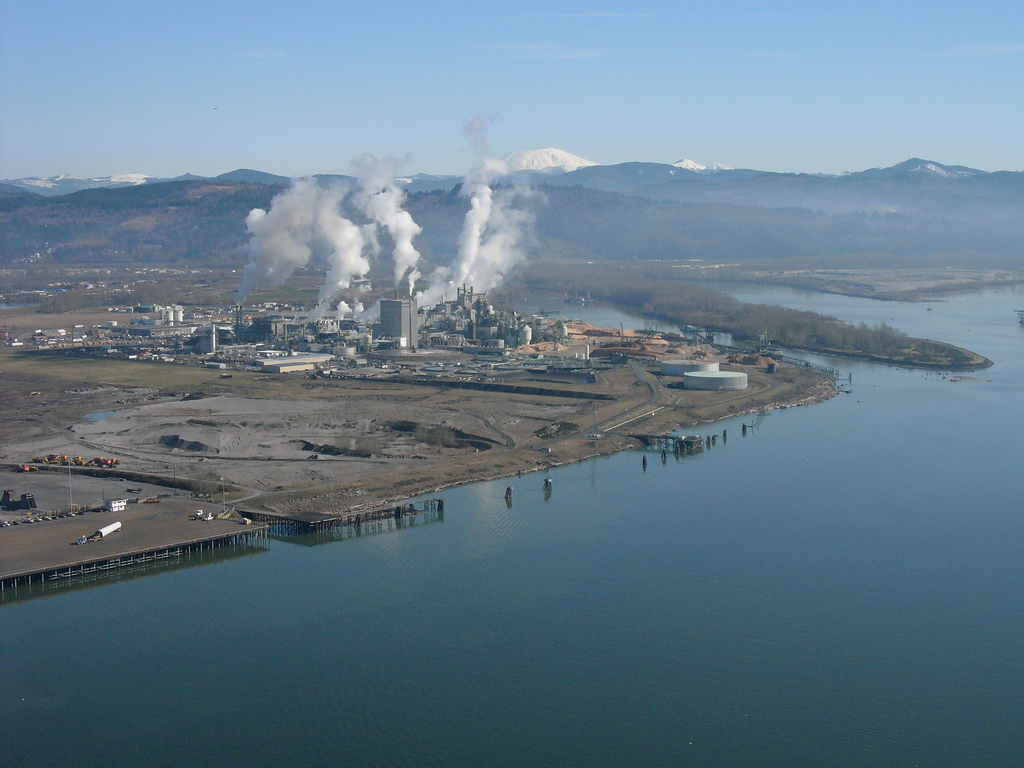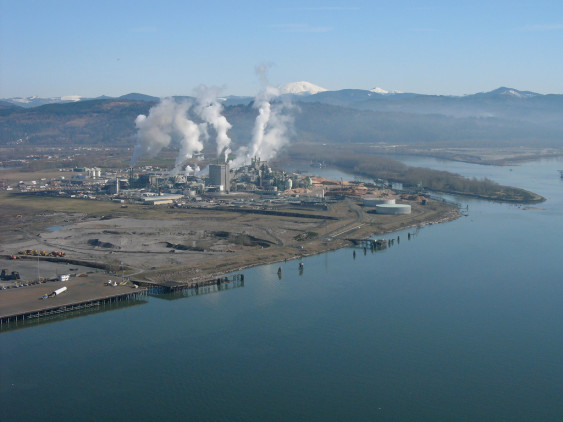Earlier this summer, a spate of news stories tried to draw a link between Washington Governor Inslee’s office and the backers of an oil refinery proposed for the shores of the Columbia River at Longview. (The Governor’s office categorically denies supporting the project.) These stories sparked sudden interest in the proposal, which has resulted in substantial confusion for many, in part because the project itself has been shrouded in secrecy and ambiguity.
So to set the record straight, and as a resource to the public, here is Sightline’s review of what we know—and what we don’t—about the Longview Refinery.
The nickel summary
A heretofore unknown firm calling itself Riverside Refining has proposed constructing a so-called micro-refinery at the Port of Longview. According to the limited information now available from the project backers, the refinery would cost at least $800 million to build and have a production capacity of 45,000 barrels per day. According to the proponents, the refinery’s “feedstock” would be composed of one-third renewable biofuels from foreign sources brought in by tanker vessels and two-thirds shale oil delivered by rail from the Bakken formation.
There is no known timeline for the project’s permitting or construction.
How the project came to light
“The refinery would cost at least $800 million to build and have a production capacity of 45,000 barrels per day.”
The project first came to the public’s attention after the environmental group Columbia Riverkeeper filed a Public Records Request with the Port of Longview in December 2014. In April 2015, Riverkeeper published a press release summarizing their findings along with links to key documents that outline Riverside’s plans to build a refinery at the Port of Longview. Among these was an unsigned Memorandum of Understanding between the Port and Riverside dated July 2014.
Riverkeeper’s press release prompted coverage from the Columbian newspaper on April 15, 2015. The Port’s spokeswoman, Ashley Helenberg, was quoted: “We do expect to receive an updated proposal. We’re still in conversations with Riverside… not all proposals become actual projects.”
Then, on May 26, 2015, the Port of Longview issued its own press release stating that, “more than a month since the Port of Longview announced a dormant Riverside Refining proposal, the company has returned with a revised project that made it past the Port’s initial review stage.”
What are the project’s benefits?
In a presentation to the Port of Longview the lead project backer, Louis Soumas, claimed the proposed refinery offers a number of benefits to the Northwest. (This presentation for the “revised project” seems to refer to Riverside Refining as a subsidiary of another firm, Waterside Energy, Inc.) According to Soumas, the refinery would be the largest “advanced renewable fuels refinery” in the US; and its construction would create 400 construction jobs during the 28-month build-out plus 150 permanent local jobs to operate the facility. The project backers claimed the facility would generate $31 million per year in local spending on utilities, services, and other purchases, along with $8 million in annual tax revenue to support schools and local government. The project’s backers have also advertised it as a purveyor of environmentally friendly fuels.
What are the project’s risks?
The project backers say they expect to receive 30,000 barrels per day of crude oil by rail—roughly 2.5 to 3 unit trains per week—from the Bakken formation in western North Dakota, where light shale oils are typically produced using a combination of fracking and advanced drilling technologies. Oil trains have proven to be notoriously susceptible to catastrophic fires—at least 10 in the last two years—as well as leaks and spills.
In addition, one-third of the refinery’s input—15,000 barrels per day, delivered by 2 to 3 vessels per month—would be what the project backers refer to as “sustainable seed and vegetable oil, used cooking oils (UCO), or other renewable feedstocks.” Yet the sustainability of these fuel sources is far from clear.
The advocacy organization Rainforest Action Network (RAN) points out that one major source of international biofuel, palm oil production, is responsible for many human rights abuses as well as deforestation in foreign countries.
In a memo outlining common misconceptions about biofuels, RAN writes: “Taking into account the slash-and-burn deforestation and drainage of peat swamps that occur to make way for palm oil plantations, as well as chemically intensive cultivation and energy-intensive refining and transcontinental shipping, palm oil is one of the worst fuel sources for the climate.” In addition, biofuel production is connected to mistreatment of indigenous communities and small-scale family farmers, according to researchers at RAN.
“Increased vessel traffic increases the risk of #oilspills on the Columbia River.”
The proposed refinery would also increase vessel traffic on the Columbia River, both to deliver biofuel to the site and to distribute the refined product to consumer markets. Increased vessel traffic increases the risk of spills on the Columbia River.
Columbia Riverkeeper also points to air pollution risks associated with the project, including carcinogens and neurotoxins that refineries emit. These risks may be especially pronounced because the refinery would be sited less than one-quarter mile from homes and commercial businesses.
Moreover, Northwest biofuel refineries have a checkered past. An ethanol plant, the Columbia Pacific Bio-Refinery near Clatskanie, Oregon, was built with substantial public subsidies but never actually operated as a renewable fuel facility. Instead, it became one of the first facilities in the region to begin receiving crude oil by rail, which it stores and transfers to oceangoing vessels. Similarly, the Imperium Biodiesel Refinery in Hoquiam, Washington is apparently not economically viable as a renewable fuel provider and is now seeking permits to begin operating as a crude oil train terminal.
Will the refinery get built?
An April 15, 2015 article in the Seattle Times made it seem as though neither the Port nor the project backers were still pursuing the Longview refinery project. Yet it is clear from the May 26 Port of Longview press release that the Riverside Refinery Project has cleared initial review and will now proceed towards “further vetting and preliminary negotiations on possible deal points.”
Although the Port is not specific about who will be doing the vetting and preliminary negotiations, it seems safe to assume that these next steps will be carried out by the Port staff, or possibly the Washington State Energy Facility Site Evaluation Council (EFSEC), the state permitting agency that governs large energy projects like refineries. The EFSEC certification itself is thorough, consisting of a six-step process that culminates in a recommendation to the Governor. It’s a process that can take several years to complete and that will provide the public some opportunities to review and comment on the project. (The most high-profile EFSEC proceeding now underway is the large oil-by-rail terminal planned for Vancouver, Washington.)
The refinery backers have apparently retained the services of Strategies 360, a public relations and lobbying firm with close ties to the Governor’s Office.
Legitimacy concerns
Dan Leahy, a sustainability advocate and retired Evergreen State College professor, discovered curious information about the companies and people involved with the project. For example, the name of the company that owns the new refinery project has changed several times. The original Memorandum of Understanding from July 2014 refers to “Riverside Energy, Inc., ” yet one early PowerPoint presentation to the Port of Longview was delivered by “Riverside Refining, LLC.” The most recent PowerPoint is marked by “Waterside Energy, Inc.,” but names “Waterside Energy, LLC” as the developer. Finally, a letter from Louis J. Soumas to EFSEC, written on March 18, 2015, identifies him as CEO of “Waterside Energy, Inc.”
Odder still, as Leahy points out, none of the firms appears to exist except on paper. The Washington Secretary of State’s website, where individuals and companies must file for incorporation in the state, has no record of any of these firms.
Neither does Texas. Although news reports have stated that the company in charge of the project is Texas-based, similar searches with the Texas Secretary of State reveal only Riverside Energy, Inc. listed as a registered entity. Yet Texas labels the firm’s entity status as “forfeited existence” and its name status as “inactive.”
Delaware, home state for many corporate registrations, does yield some clues. Both Riverside Energy, Inc. and Riverside Refining, LLC, are listed in the Secretary of State’s company database. According to Delaware, Riverside Energy Inc. was incorporated in January of 1992, although its current entity type is listed as “closed.” Meanwhile, Riverside Refining, LLC, was incorporated in June 2014—just one month before the unsigned Memorandum of Understanding with the Port of Longview was dated. And a Waterside Energy, LLC—the project developer from the most recent PowerPoint—apparently incorporated in Delaware in May 2015, two months after the company sent a letter to EFSEC.
The PowerPoint presentation to the Port of Longview names Lou Soumas, Chris Efird, and Damon Pistulka as primary team members for the project. As Leahy discovered, they’re a team that has run into trouble before.
In September of 2014, the Wolfkill Feed & Fertilizer Corporation filed a legal complaint against Pistulka, Soumas, Efird, and fourth man, Joseph Rozelle. According to that complaint, while conducting business as CEO (Pistulka), Director (Soumas), CFO (Rozelle), and Director (Efird) of a company called Transmessis Columbia Plateau, LLC, the men failed to pay back over $1.6 million in loans they had accumulated between November 2013 and April 2014. (Transmessis operated an oilseed and biodiesel production company in Odessa, Washington, until it closed due to “market conditions” in July 2014, after operating for less than a year.) The complaint accuses Transmessis of supplying false credit information and failing to pay back funds loaned to them by Wolfkill. Moreover, “on information and belief, [Transmessis] chose to divert its revenues to pay its officers and directors varying levels of compensation, including Defendant Pistulka, Defendant Joseph Rozelle, Defendant Christopher Efird, Defendant Louis Soumas and potentially other entities owned or controlled by these individuals.”
What’s next?
It’s far from clear how (or even whether) the Longview Refinery project will proceed. Given the lack of clarity about key features of the project backers, their timeline for proceeding, and the regulatory process for evaluating the proposal, it’s difficult to know how serious the idea really is. Yet we know from public records requests that senior officials in both local and state government have had multiple meetings with the project’s proponents, so it’s reasonable to conclude that their plans will develop into a concrete proposal relatively soon. When more information becomes public, Sightline is committed to a full public analysis of the project.












Jan Woodruff
Thank you Sightline for digging up this information about the latest Oil Cowboy scheme to hit the Wild West. Confirms my suspicion that these greedy bastards care about only one thing: money. Dragged out the old “Jobs!” promise. Before Longview gets too excited, they should research Shell in Anacortes. Shell always claims (lies) that they’re employees live in and care about our community. At public hearings, where they swear to tell the truth, Shell claims to be Anacortes’ biggest employer. Nope. Shell Oil is Anacortes’ biggest contractor of out-of-state refinery workers. I’ve had six men from Texas living beside me for six months. Residents of Longview: make sure your elected officials are not being snookered by Oil Cowboys. Moreover, make sure they’re not colluding w/these shady characters. Truth out. Sightline rocks!
Phil
Bet ya dollars to donuts, their plan to refine ‘bio-fuels’ is just a ruse &/or ploy to get taxpayers to fund their refinery.
Dan Leahy
Eric,
Thanks for the citation in your report. If people would like to read my complete article, it’s available in the Olympia based newspaper, Works in Progress, July 2015 edition. Dan
http://olywip.org/can-longview-oil-refinery-pass-due-diligence-an-examination-of-the-companies-and-individuals-behind-the-dubious-proposal/
Eric de Place
Thanks, and sorry about that Dan. I’ve updated the post to include a direct link to your page.